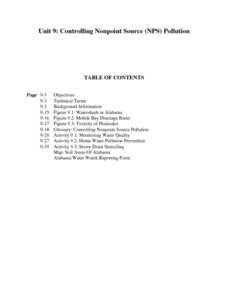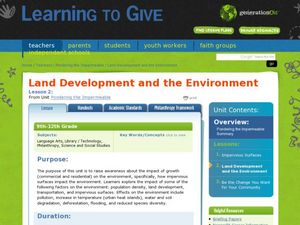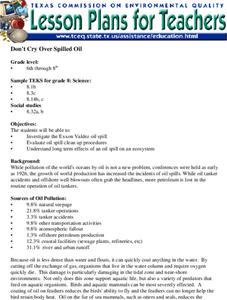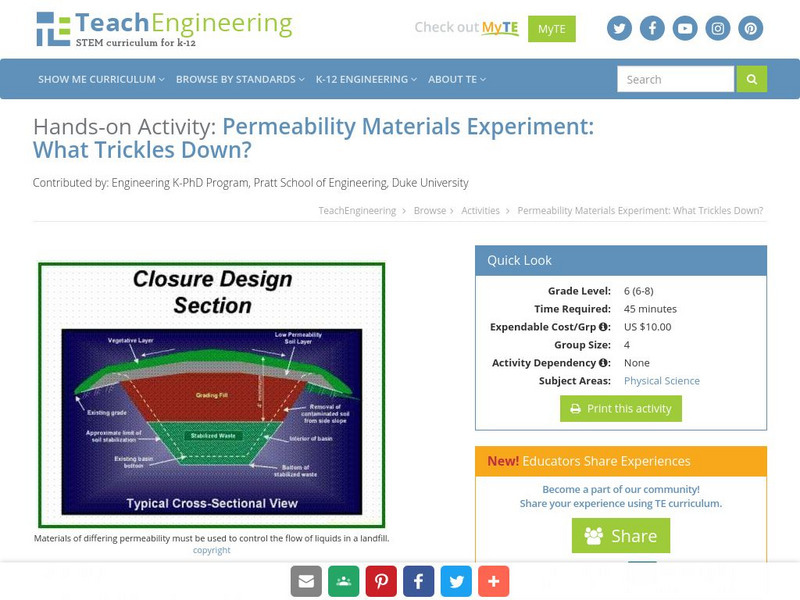Curated OER
Controlling Nonpoint Source Pollution
Students examine factors affecting water quality. They test water in a local body of water to determine its quality. They collect data and continue monitoring the water monthly. They assess water quality in the home and on the farm.
Curated OER
Land Development and the Environment
Students examine the relationship between land development and the environment. In this environmental stewardship lesson, students explore how population density, land development, transportation, and impervious surfaces take their toll...
Curated OER
Nutrients In Chesapeake Bay
Learners perform pH and turbidity test to determine water quality. In this environmental science instructional activity, students analyze NASA database on chlorophyll-a in the bay. They explain how a small river area affects Chesapeake Bay.
Curated OER
Don't Cry Over Spilled Oil
Middle schoolers study the Exxon Valdez Oil Spill while evaluating oil spill clean up activities. They discover the long term impact can have on an ecosystem by completing this experiment.
Curated OER
N, B, and T: Pollutants Three
Students explore nutrient, bacterial, and toxic surface water pollution. They identify the amount of water they use each day and summarize the kinds of substances that cause water pollution. They predict what will happen in water...
Curated OER
How Much Is An Ecosystem Worth?
Students explain and discuss the importance of ecosystems. They analyze the natural resources in the environment. They also suggest actions that would protect ecosystems.
Michigan Sea Grant
Water Quality
Learners observe water samples and measure the samples' water quality. Students develop their own criteria for measuring water quality and test for temperature, acidity, oxygen levels, turbidity, conductance, sediment and hardness.
Curated OER
Know Your Watershed
Students investigate the importance and the location of their own watershed by visiting and EPA website and also work in groups to create an action plan on how to protect their local watershed.
Curated OER
Got Water?
Students determine that delivering clean, fresh water to citizens around the world involves and affects politics, economics, international relations, and technology. They brainstorm a list of factors that might affect their town's...
Curated OER
What Are We?
Students describe different types of water pollutants. They complete experiments in which they observe the affects of water pollution on algae. They also brainstorm and list three causes of each water pollutant.
Curated OER
Land Use and Nitrogen
Students consider the effects of development on water quality. They test nitrogen levels in waters before and after development, investigate wastewater treatment options and research best management practices to reduce nitrogen loads.
US Geological Survey
Usgs: Water Science for Schools Effects of Urbanization
This U.S. Geological Survey website offers a short article then lists topics that are linked to brief articles that describe that particular topic's effect on water quality in urban areas. Click Home to access the site in Spanish.
TeachEngineering
Teach Engineering: Natural and Urban "Stormwater" Water Cycle Models
Students apply their understanding of the natural water cycle and the urban stormwater water cycle, as well as the processes involved in both cycles to hypothesize how the flow of water is affected by altering precipitation.
TeachEngineering
Teach Engineering: Natural and Urban Stormwater Water Cycles
Through an overview of the components of the hydrologic cycle and the important roles they play in the design of engineered systems, students' awareness of the world's limited fresh water resources is heightened. The lesson lays the...
US Geological Survey
USGS: Urbanization and Water Quality
This website focuses on water quality issues in relation to urbanization. There are helpful links to brief articles on topics like storm runoff, wastewater, and the underground water table. Click "Water Science School HOME" to access the...
TeachEngineering
Teach Engineering: The Other Water Cycle
For students that have already been introduced to the water cycle, this instructional activity is intended as a logical follow-up. Students will learn about human impacts on the water cycle that create a pathway for pollutants beginning...
BSCS Science Learning
Bscs: Heavy Metals in Waterways
This inquiry focuses on heavy metals in waterways in Colorado. Young scholars will learn about heavy metals and data collected about them from citizen scientists, and then analyze the data in tables and maps to identify possible evidence...
TeachEngineering
Teach Engineering: What Trickles Down?
Permeability is the degree to which water or other liquids are able to flow through a material. Different substances such as soil, gravel, sand, and asphalt have varying levels of permeability. In this activity, students will explore...
Other
Virtual Field Trip: Water/aquifers
This virtual field trip for middle school students looks at aquifers and their place in the hydrologic cycle. Students learn why and how it is important to protect the source of your drinking water and some unique details about the...


















